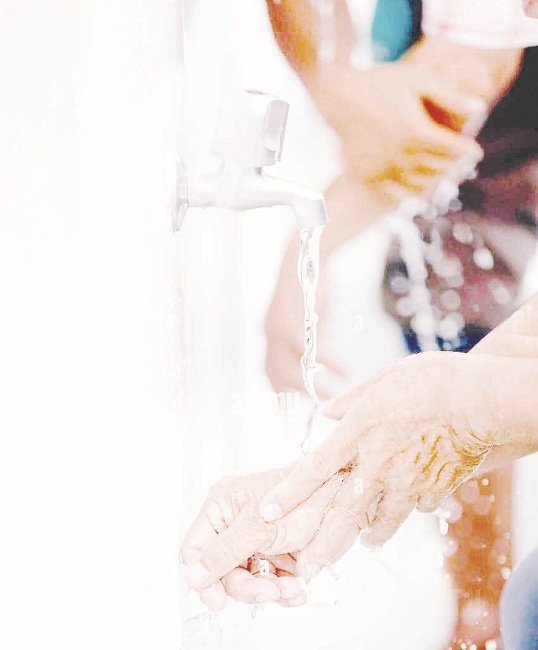Therapeutic Benefits Of Ablution
[ad_1]
THE Global Hygiene Council recommends the washing of the hands six times a day. And the World Health Organisation (WHO) describes hand hygiene as “the most important measure to avoid the transmission of harmful germs.”
But Islam, the religion of peace, propounded a solution to global pandemic more than 1,400 years ago. Prophet Muhammad (SAW) gave the world a prescription of 26 washing movements to be carried out five times a day, a total of 130 daily washing movements to grant us optimal health.
Before a Muslim performs salah (prayer), he must carry out an ablution. Allah says: “O ye who believe! When ye prepare for prayer, wash your faces, and your hands (and arms) to the elbows; rub your heads (with water); and (wash) your feet to the ankles. If ye are in a state of ceremonial impurity, bathe your whole body. But if ye are ill, or on a journey, or one of you cometh from offices of nature, or ye have been in contact with women, and ye find no water, then take for yourselves clean sand or earth, and rub therewith your faces and hands. Allah doth not wish to place you in a difficulty, but to make you clean, and to complete his favour to you, that ye may be grateful.” (Chapter 5, Verse 6).
Muslims are encouraged to perform ablution not only before praying or going to bed but also when entering the mosque, making the call to prayer, delivering a sermon, after visiting a graveyard, after touching or carrying a dead person and also before reading the Qur’an.
We are also encouraged to do ablution while in a state of anger for the cooling and refreshing effect of the water. We are told that anger is from the devil, made out of fire, and can therefore be put out by water.
Ablution is also known for softening, cleaning and refreshing of body parts. Thus, ablution comprises washing the hands, arms right up to the elbow, face, mouth, nostrils and feet up the ankle, all three times each. The inside and behind the ears, as well as the part of the head above the forehead is wiped once.
Chinese reflex therapy is one of the most relaxing therapies. It uses water to massage the BAS-Biological Active Sports. Ablution is also a hydro-based reflex therapy as it tends to fasten the body’s biological rhythms, notably the BAS.
Yoga experts also emphasise that washing important motor and sensory organs such as the hands, arms, eyes, legs, mouth and genitals before sleep using cool water relaxes the body, preparing it for a deep sleep.
Moving forward, Muktar Salem, in his writing entitled ‘Prayer, a spot for the body and soul’, speaks about the health benefits of ablution.
He says ablution helps prevent skin cancer. Research has proved that one of the main reasons behind skin cancer is that the skin is exposed to chemicals, especially petrochemicals, and the best way to prevent skin cancer is by constantly removing them.
The areas that are washed during ablution, it is said, are the parts of the body that are most exposed to pollution, whether it is pollution from the internal secretions of the body onto the skin surface such as sweat, or whether it is external, ablution removes this ‘pollution’ five times a day, and hence maintains a clean outside layer of skin, which in turn helps the cells underneath to function properly.
Also, washing with water helps invigorate the ends of the blood vessels, as well as the nerves and glands that are near the skin surface, and hence helps them perform their functions efficiently.
Ablution is a defence against diseases like pneumonia, coronavirus, Ebola, etc. As we all know that the hand is the part that carries germs the most to other parts of the body, a study suggests that only if people wash their hands, they would not get affected with pneumonia. As the major slogan to prevent coronavirus is ‘wash your hands with soap and water’, washing of hands will not only prevent coronavirus but also viruses and diseases like Ebola, pneumonia and monkeypox.
The obvious reason behind washing the mouth during ablution, Salem says, is to remove the food particles, which could cause teeth and gum problems. That is also the reason siwak (brushing one’s teeth) is also encouraged before ablution.
This simple mouth rinsing during ablution is of benefit as it helps you stay away from systematic diseases. The research journal named ‘Systemic Diseases Caused by Oral Infection’, published by Clinical Microbiology, suggests that those who do not take care of oral hygiene are vulnerable to diseases like bacterial pneumonia, osteoporosis, low birth weight and diabetes-related complications.
Washing one’s nostrils is also a preventive health measure as the germs trapped in the nostrils are removed and do not pass on to the respiratory system. Washing the nose with water helps purify it from dust and harmful microbes. The study reveals that people who perform wudu were free from such harmful microbes in their nose while those who didn’t house many.
According to a study conducted by a team of doctors in Alexandria University, the Prophetic tradition, which urges the exaggeration of washing the nostrils by introducing the water in the nostril then blowing it out positively affects the inner coating of the nostrils. Those who carried out the washing in the correct form had clean, shiny nostrils with no dust clinging to the little hairs inside. However, those who did not perform ablution had light coloured, greasy nostrils and their nostril hairs fell off easily.
Repeated washing of the face invigorates the facial skin cells and helps prevent early wrinkles as well as having a cleansing effect on the inside of the eyes, which prevents eye infections, says Salem.
However washing of arms activates blood circulations. When we wash our arms and perform an easy exercise, we are stimulating blood circulation in the body. This makes a person feel active and energetic.
Washing the ears helps rid them of wax accumulation which may cause ear infections as well as affect the inner ear, which eventually causes body imbalances.
Washing between the toes while washing the feet is also extremely important, says Salem, as it prevents the foot, which in our modern times is trapped most of the day inside shoes, from acquiring athlete’s foot.
Over all, he adds, ablution also has an exercising effect on all the muscles involved in its movement, which are thus being stimulated five times a day or even more according to repetition.
Abubakar, a student of Summit University, Offa, is currently an intern at the Nigerian Tribune.
[ad_2]















Post Comment